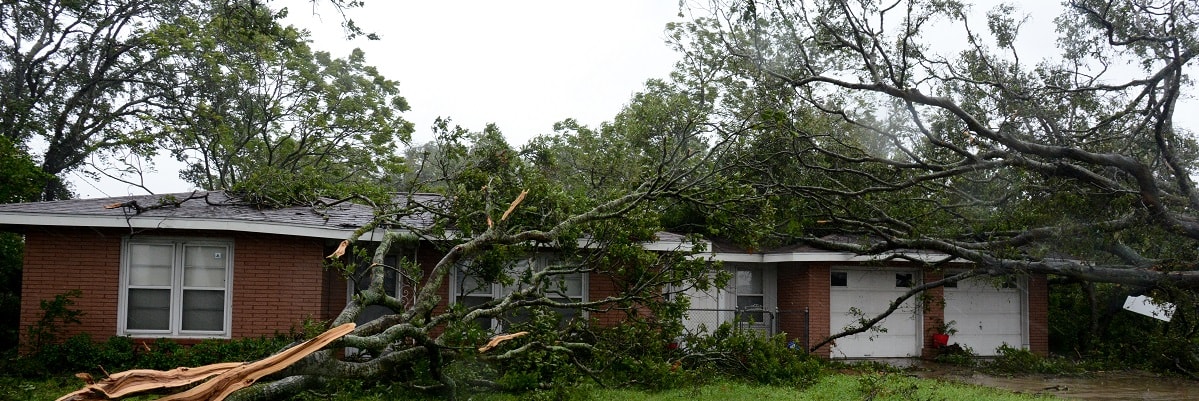what to do if caught in a hurricane
Hurricanes: Before, During & After

The Atlantic hurricane season runs from June to Nov. The best manner to protect yourself and your family in case of a hurricane is to follow these steps:
- Identify a safety space on lower floors just non the basement; evacuate when instructed by government.
- Turn effectually, don't drown – avert alluvion waters.
- Prepare for secondary risks such equally flooding, landslides and damaged buildings.
Earlier
- The fundamental to staying safety is to ready and to have an emergency plan in place.
- Listen to local news and weather reports for whatsoever potential hurricane watches and warnings in your expanse.
- Find out if you lot live in an area where hurricanes could happen and sign up for local alerts.
-
Know the difference between a hurricane warning and a hurricane sentinel:
- Ahurricane warning means a hurricane is already occurring or will occur before long in your area. Evacuate if advised to do so.
- Ahurricane watch ways a hurricane is possible in your surface area. Stay warning for more information.
- Trim expressionless branches and cut downwards dead copse to reduce the danger of these falling onto your house.
- Secure everything on your property that can exist diddled around or torn loose.
- Secure windows and doors; motility electronics and valuables away from breakable glass.
- If you live on the declension or in a low-lying area near the coast, be ready to motion inland or to higher footing. High winds can create large waves, which may go tempest surges when they reach the shore.
- Take your emergency kit ready. Families should be prepared to exist cocky-sustaining for at least 3 three days. Kits should include applied items such as drinking water, food, cash, and a portable radio. However, they should also include items that are unique to your own families' needs. This could include baby items, medical prescriptions, pet food, etc.
- If y'all have already dipped into your emergency kit and food supply while staying at home, consider safely getting the supplies to replenish it following your local public wellness regime' guidelines for leaving your residence.
- During the COVID-19 pandemic also add hygiene items such as mitt sanitizer and non-medical masks to your kit to keep your family safe during an evacuation.
During
- Be prepared to evacuate at a moment'southward observe.
- Stay informed by listening to the latest warnings and advisories. Melody in to the radio or local news channels, and/or follow your local news outlet and emergency officials on social media. You can also detect information on the Canadian Hurricane Centre website.
- Plow around - don't drown!Avoid walking and driving through flooded areas.
- Never become out in a gunkhole during a storm. If you are on the water and you encounter bad weather approaching, head for shore immediately. Practise not become down to the water to watch the storm.
- Evacuate if advised by authorities or customs leaders. Be careful to avoid flooded roads and done-out bridges.
- If the eye of the hurricane passes over, at that place volition exist a lull in the current of air lasting from 2 or iii minutes to one-half an 60 minutes. Stay in a rubber place on the primary floor but non in the basement during this fourth dimension. Remember once the eye has passed over, the winds will return from the reverse direction.
Afterward
Continue to have precautions and mind to and follow directions from local government.
- Tune in to the radio or local news channels, and/or follow your local news outlet and emergency officials on social media.
- Stay alert for extended rainfall and subsequent flooding even afterwards the hurricane or tropical storm has ended.
- Be prepared for secondary disasters such as flooding, landslides and edifice damage.
- If y'all suspect your home is unsafe, practice non enter. Rely on the professionals to articulate your dwelling for re-entry, if you are unsure.
- Stay away from damaged areas and fallen power lines. Sentinel out for debris such as canvas metal, drinking glass or other sharp fabric.
- Do not use water that may have been contaminated. Throw out food that may have been contaminated, including from refrigerator and freezers.
- Vesture long pants, a long-sleeved shirt and sturdy shoes when cleaning up.
- Examine your walls, doors, staircases, and windows for impairment.
- Have pictures of damage, both of the edifice and its contents, for insurance claims.
- Check with local authorities on how to properly dispose of damaged items from your habitation.
- Experiencing a disaster is challenging enough, but during the COVID-19 pandemic information technology tin can feel even more difficult. The Red Cantankerous has many resources available to help you navigate these challenging times. You tin also detect mental and emotional wellbeing resources on the Public Health Agency of Canada, or any provincial/territorial health authority website.
Later a Disaster
Recovering subsequently a disaster can be overwhelming. Check out what resources the Ruby-red Cross has to offer.
Read more than
Get an Emergency Kit
Getting or making a kit is the final stride in existence set for any emergency. Observe out what you need to put in it.
Read more
Source: https://www.redcross.ca/how-we-help/emergencies-and-disasters-in-canada/types-of-emergencies/hurricanes
0 Response to "what to do if caught in a hurricane"
Post a Comment